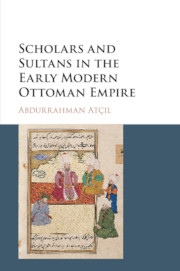Book contents
- Frontmatter
- Dedication
- Contents
- List of Tables
- Notes on Usage
- Acknowledgments
- Introduction
- Part I Scholars during the Early Ottoman Period (1300–1453)
- Part II The Formation of the Hierarchy (1453–1530)
- 3 Introducing the Ottoman Empire
- 4 Scholars in Mehmed II's Nascent Imperial Bureaucracy (1453–1481)
- 5 Scholar-Bureaucrats Realize Their Power (1481–1530)
- Part III The Consolidation of the Hierarchy (1530–1600)
- Conclusion
- Glossary
- Bibliography
- Index
5 - Scholar-Bureaucrats Realize Their Power (1481–1530)
from Part II - The Formation of the Hierarchy (1453–1530)
Published online by Cambridge University Press: 24 November 2016
- Frontmatter
- Dedication
- Contents
- List of Tables
- Notes on Usage
- Acknowledgments
- Introduction
- Part I Scholars during the Early Ottoman Period (1300–1453)
- Part II The Formation of the Hierarchy (1453–1530)
- 3 Introducing the Ottoman Empire
- 4 Scholars in Mehmed II's Nascent Imperial Bureaucracy (1453–1481)
- 5 Scholar-Bureaucrats Realize Their Power (1481–1530)
- Part III The Consolidation of the Hierarchy (1530–1600)
- Conclusion
- Glossary
- Bibliography
- Index
Summary
The five decades from Mehmed II's death through the first decade of Süleyman's reign can be viewed as a time of crises as far as the supreme authority of the sultan was concerned. Mehmed II's reforms had established the Ottoman family's superior position and significantly curbed the influence of centrifugal groups and all other families in the polity. Yet, for almost fifty years after his death, intermittent periods of political uncertainty and power vacuums encouraged bureaucratic and aristocratic groups, both inside and outside the center, to acquire some influence in the empire's affairs and to restrict the sultan's authority.
I suggest that the discursive and practical responses made by the sultans and their competitors to solve these problems helped strengthen the scholar-bureaucrats’ authority in the polity. The frequent calls to follow sharia and realize justice elevated the status of scholar-bureaucrats, who could claim to be holders of moral authority and defenders of sharia and justice. In addition, the need to receive the scholar-bureaucrats’ religio-legal sanction to justify military action against fellow Muslims (viz., the Safavids and the Mamluks) further strengthened their position. Furthermore, beginning with Bayezid II, the sultans' articulation of the dedication to the Ottoman dynastic tradition and continuity confirmed the normative status of Mehmed II's reforms. This meant that the hierarchical order of scholar-bureaucrats was not a transitory arrangement and would continue as long as the dynasty did. The hierarchical order involved scholar-bureaucrats’ relationship with the Ottoman government through a link of institutional nature, regulated and protected by impersonal laws.
Scholar-bureaucrats were both participants and beneficiaries of the developing discourse and policies. Having their rights recorded in the now unchallengeable law code (kanunname), not to mention their providing significant services to legitimize the dynasty and its policies, they increasingly appeared as the constituent elements of the polity. In conjunction with these changes, their attitudes began to change. Becoming fully aware of the advantages that their positions could bring, they sought to underline their distinction from those scholars who remained outside the government service (nonbureaucratic scholars). In addition, they tended to perceive their hierarchical order as something restricted and superior, and thus wanted to limit membership in it to their own students and protégés.
- Type
- Chapter
- Information
- Scholars and Sultans in the Early Modern Ottoman Empire , pp. 83 - 116Publisher: Cambridge University PressPrint publication year: 2016

